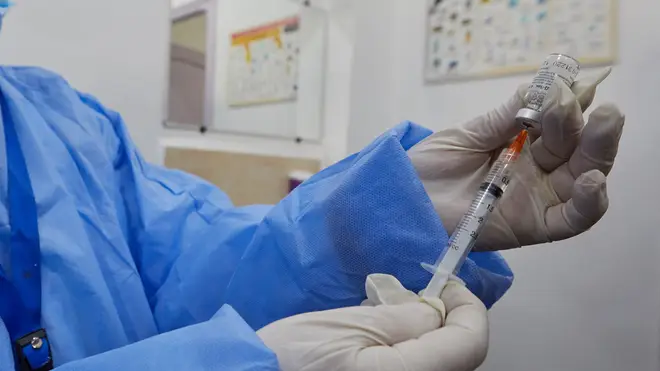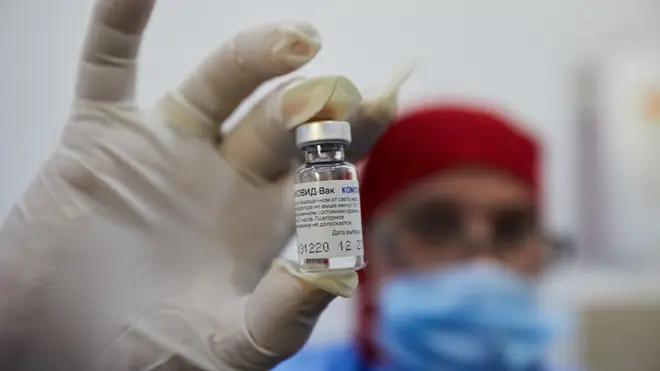
Matthew Wright 7am - 10am
2 February 2021, 18:48 | Updated: 2 February 2021, 23:13

The University of Oxford's coronavirus vaccine offers protection of 76% up to 12 weeks after a single dose and may reduce transmission by 67%, according to a new study.
After the second dose, vaccine efficacy from two standard doses is 82.4% with the three-month interval being used in the UK, researchers from the University of Oxford say.
The data from the study, which has not yet been peer reviewed, supports the four to 12-week prime-boost dosing interval that many global regulators have recommended.
Analyses of positive coronavirus swabs in the UK population suggest the vaccine may have a substantial effect on transmission of the virus, with a 67% reduction in positive swabs among those vaccinated with the Oxford/AstraZeneca jab.
Before these results, little was known about how effective the Covid-19 vaccines were at preventing transmission of the disease.
Read more: Captain Sir Tom Moore dies aged 100 after testing positive for Covid-19
Read more: Covid cases with 'mutation of concern' identified in Liverpool and Bristol

Researchers at the University of Oxford have published the preprints, which reveal that the vaccine efficacy is higher with longer intervals between doses, and that a single dose of the vaccine is 76% effective from 22 to up to 90 days post-vaccination.
Professor Andrew Pollard, chief investigator of the Oxford Vaccine Trial, and study co-author, said: "These new data provide an important verification of the interim data that was used by more than 25 regulators including the MHRA (Medicines and Healthcare products Regulatory Agency) and EMA (European Medicines Agency) to grant the vaccine emergency use authorisation.
"It also supports the policy recommendation made by the Joint Committee on Vaccination and Immunisation (JCVI) for a 12-week prime-boost interval, as they look for the optimal approach to roll out, and reassures us that people are protected from 22 days after a single dose of the vaccine."
News the Oxford/AstraZeneca vaccine appears to cut transmission rates by 67% could prove to be the "holy grail" of the global vaccine rollout, according to a leading pharmacologist.
Dr Gillies O'Bryan-Tear said the results, which have yet to be peer reviewed, were the first definitive estimate of the impact of vaccination on transmission rates.
"If the effect on transmission is confirmed for the Pfizer vaccine too, this would be a very positive," he said.
"If these vaccines reduce transmission to the extent reported, it will mean that the easing of social restrictions will be enabled sooner, than if we have to wait for herd immunity - which may never in fact be achieved because of insufficient vaccine population coverage."
He added: "That would be the holy grail of the global vaccine rollout, and these data bring us one step closer."

Are some vaccines better at protecting against new strains?
Health Secretary Matt Hancock said: “This is a hugely encouraging study and further reinforces our confidence that vaccines are capable of reducing transmission and protecting people from this awful disease. This report shows the Oxford vaccine works and works well.
“More than 9.6 million people have already received the first dose of their Covid-19 vaccine and the NHS is working tirelessly to vaccinate as many people as possible in every part of the UK.”
Vaccines minister Nadhim Zahawi tweeted: "This is a really promising study and further reinforces our confidence that vaccines work and protect our most vulnerable from this awful disease
Read more: Door-to-door testing to root out 'every single case' of South Africa Covid variant
Read more: Mutation of Kent Covid-19 variant 'could impact effectiveness of some vaccines'
This is a really promising study and further reinforces our confidence that vaccines work and protect our most vulnerable from this awful disease 💉💉💉👇🏾 https://t.co/xxpbmhCiba
— Nadhim Zahawi (@nadhimzahawi) February 2, 2021
Government data up to January 31 shows of the 9,790,576 jabs given in the UK so far, 9,296,367 were first doses - a rise of 319,038 on the previous day's figures.
Some 494,209 were second doses, an increase of 3,156 on figures released the previous day.
The seven-day rolling average of first doses given in the UK is now 388,971.
Based on the latest figures, an average of 407,402 first doses of vaccine would be needed each day in order to meet the Government's target of 15 million first doses by February 15.
However, the daily rate has been increasing ahead of the deadline in two weeks' time.
Data for January 30 showed 598,389 people were vaccinated in the UK.

Volunteer shows LBC how Covid home kit works
Yesterday, speaking at a Downing Street press conference, Health Secretary Matt Hancock said more than 900,000 people were vaccinated over the weekend.
Mr Hancock said almost nine in 10 of all those aged over 80 had been vaccinated, with over half of those in their 70s receiving a jab.
He added: "We have visited every single care home with older residents in England and offered vaccinations to all of their residents and staff - this has been an incredible example of health and social care working together."
At the same press conference, NHS England's Professor Stephen Powis said he was "confident" that the Government was on track to reach its vaccination targets, including the clinically vulnerable.